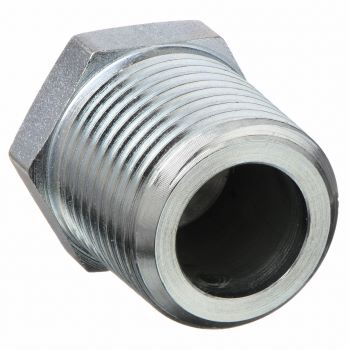Hydraulic systems are the lifeblood of many machines and industrial processes. They transfer power using pressurized fluid. This enables them to operate everything from construction equipment to agricultural machinery. But, like any complex system, hydraulics need proper maintenance. They must work efficiently and safely.
Here’s where hydraulic hex plugs come in – these seemingly simple components play a vital role in keeping your hydraulic systems in top shape.
What are Hydraulic Hex Plugs?
Hydraulic hex plugs are also known as hex head plugs or socket head plugs. They are screw-threaded fasteners made for use in hydraulic systems. They are used to seal ports, openings, and connections within the system, preventing leaks and contamination.
Hydraulic hex plugs are often made from strong materials. These include steel, brass, or stainless steel. They can withstand the high pressures of hydraulic fluids. They come in various sizes and thread types to match different port configurations in hydraulic systems. Also, hydraulic hex plugs are available in various pressure ratings. They suit specific applications.
Applications of Hydraulic Hex Plugs
Hydraulic hex plugs have a wide range of applications across various industries. Here are some common examples:
✅ Construction: Sealing hydraulic lines during excavator maintenance, plugging ports on unused cylinders in backhoes.
✅ Agriculture: Securing hydraulic ports on tractors and other farm equipment during storage or transportation.
✅ Manufacturing: Plugging test ports on hydraulic presses, sealing off unused lines in assembly lines.
✅ Mobile Equipment: Protecting hydraulic components on forklifts and cranes during maintenance or repairs.
Hydraulic hex plugs create a tight seal. This seal stops leaks. Leaks can cause fluid loss, reduced system performance, and environmental hazards. They also act as barriers. They keep out contaminants like dirt, debris, and moisture. These things can damage the hydraulic system’s internal parts.
Benefits of Using Hydraulic Hex Plugs
There are many benefits to adding hydraulic hex plugs to your hydraulic system maintenance. Here are some of the key benefits:
✅ Leak Prevention: Hydraulic hex plugs ensure a secure seal, preventing leaks that can waste valuable fluid and compromise system performance.
✅ Contamination Control: They act as a barrier, keeping out contaminants that can harm internal components and lead to malfunctions.
✅ System Protection During Maintenance and Storage: Hydraulic hex plugs are essential for isolating components during maintenance procedures and protecting them from dust and moisture during storage.
✅ Cost-Effective Solution: Hydraulic hex plugs are a relatively inexpensive way to maintain the integrity of your hydraulic system and prevent costly repairs down the road.
Choosing the Right Hydraulic Hex Plug
Picking the right hydraulic hex plug requires considering many factors. This is to ensure the best performance and system compatibility. Here’s a quick guide:
✅ Pressure Rating: Choose a plug with a pressure rating that exceeds the maximum operating pressure of your hydraulic system.
✅ Port Size and Thread Type: Ensure the plug matches the size and thread pattern of the port you intend to seal.
✅ Material Compatibility: Select a plug material compatible with the type of hydraulic fluid used in your system.
✅ Reusability Requirements: Determine if you need a reusable plug or a disposable one-time-use option.
Installation and Maintenance Tips for Hydraulic Hex Plugs
For proper installation, clean the port threads and apply a light coat of thread sealant before screwing in the hydraulic hex plug. Tighten the plug snugly but avoid over-tightening, which can damage the threads. When removing the plug, use the appropriate wrench size to avoid stripping the head.
To extend the lifespan of your hydraulic hex plugs, inspect them regularly for signs of wear or damage. Replace any cracked, chipped, or excessively worn plugs to ensure optimal system performance.
Conclusion
Hydraulic hex plugs are small but crucial. They significantly contribute to the health and longevity of your hydraulic systems. By understanding their uses and benefits, and choosing and using them right, you can ensure your hydraulic equipment runs well.
If you have questions about picking the right hydraulic hex plugs, consult a hydraulics specialist. They can give expert guidance.
Post time: May-03-2024


